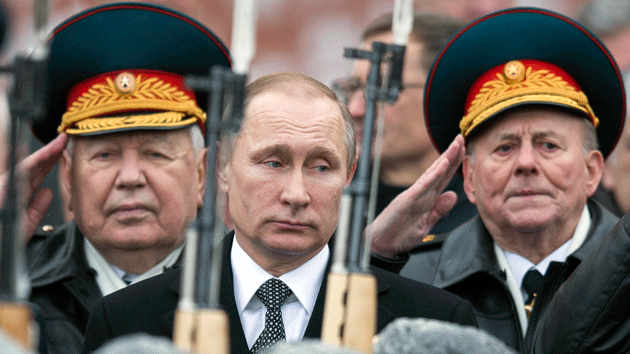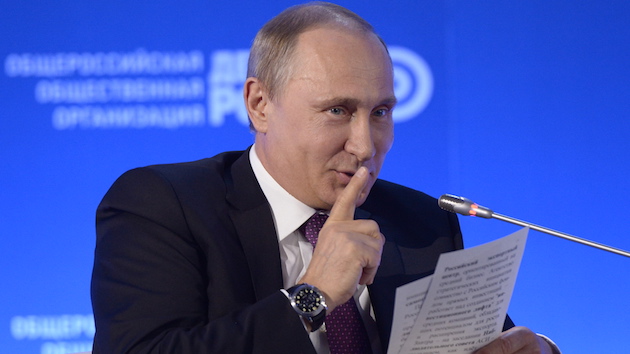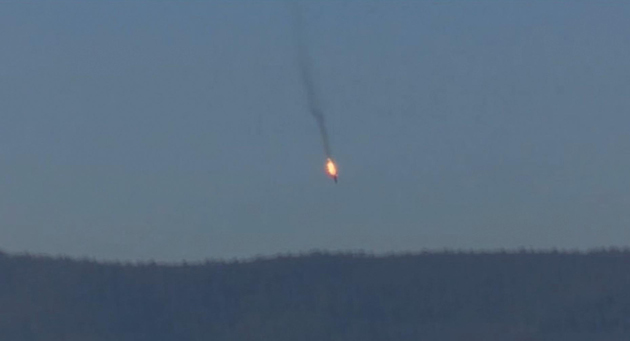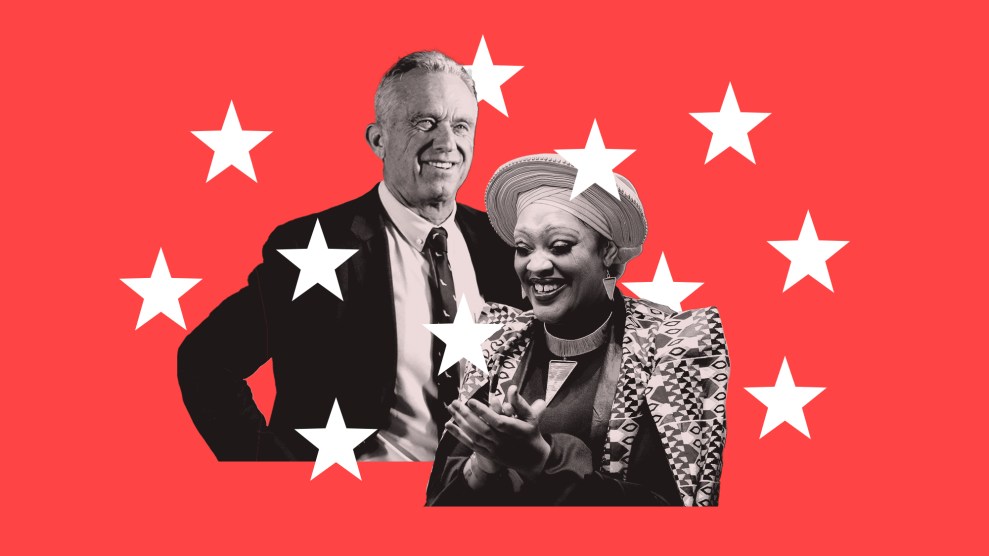
Russian President Vladimir Putin at a national holiday honoring Russia's military, February 2016Pavel Golovkin/AP
The morning after Russian President Vladimir Putin’s military seized the Crimean Peninsula from Ukraine in March 2014, Sanita Jemberga woke up at her home in Latvia thinking, “We’ve seen this before.” There were no Russian troops amassed at Latvia’s border, but according to Jemberga, a reporter at Latvia’s Re:Baltica Center for Investigative Journalism, the conditions inside her country were strikingly similar to those in Ukraine prior to the takeover there: Kremlin-friendly politicians in power, a large ethnic Russian population, some of which had grown increasingly vocal about their allegiance to Putin’s worldview, the predominance of Kremlin-run TV channels, and a network of nongovernmental organizations covertly funded by the Russian Federation.
Jemberga worried: Was her own small country next? The Baltic nations have European Union and NATO protection, but nonetheless Jemberga saw how the Kremlin could destabilize a country with relatively little blowback from the international community.
The Master Plan, a sobering new documentary film produced by Re:Baltica and several journalism partners in the Baltic region, investigates Putin’s imperial ambitions. Opening at the end of Russia’s 2008 war in Georgia, the film focuses on how the Kremlin has been influencing the local population and politics in the Baltic states, home to upward of 1 million Russian-speaking residents. It shows how the Kremlin funded and otherwise meddled on behalf of local politicians with pro-Putin views to get them elected to important international posts, as with Latvia’s Tatjana Zdanoka, who won a position in the European parliament with Russia’s support. In the film, Georgiy Muradov, then-envoy of Moscow City Council, describes her to a Russian enclave as “today’s only compatriot at the European Parliament who is consistently representing the interests of our compatriots.”
The Master Plan follows the money behind a network of Russia-sponsored NGOs, with offices in more than 100 countries, uncovering a trail revealing at least $100 million provided annually by the Kremlin—an amount the filmmakers suspect is the tip of an iceberg. The film shows how some of these NGOs have pushed alternative history books, providing them free to schools throughout Europe. Among other topics, for example, the books cast Russia as having liberated the Baltic States from Germany, rather than occupying them. The legitimacy of the Baltic States’ independence is questioned, and their annexation is justified. Leaders of other NGOs hold forth at various international summits abroad, working to promote Russia’s foreign policy interests.
The most compelling aspect of The Master Plan is how it surveys Russia’s relentless propaganda war in the Baltic states. The Russian state media channels are freely accessible in the Baltics and the main news source for 70 percent of their Russian-speaking communities. They have gone to great lengths to “create a fog around the truth,” as Inga Springe, another Re:Baltica journalist, puts it. Much of the rest of the local population feels they can’t trust any version of the information they receive. Meanwhile, the few Russian journalists who strive to report real news are often fired, and at times forced into exile. Galina Timchenko, the former editor-in-chief of lenta.ru, previously one of the most popular news sites in Russia, was fired by the Kremlin-linked owner at the lead up to the Crimean takeover. “They needed to clear the information channels before the Crimean operation,” Timchenko says in the film, speaking from the office of her new media outlet, Meduza, based in Latvia.
There is no shortage of evidence from other sources supporting the film’s premise. On April 30, the Institute for the Study of War released an account of Russia’s actions in Europe, stating, “Russia continue[s] to conduct a campaign of information warfare against the Baltic States, paired with political pressure and military provocation. The efforts aim to provoke ethnic strife and undermine the stability of regional governments. Russia’s actions prompted the Latvian government to ban access to a major Russian news outlet.” Then there is the work on Russia’s misinformation campaigns and acts of aggression from the investigative outlet Bellingcat, most notably its reporting on Malaysian Airlines flight MH17, which was shot down over eastern Ukraine in the summer of 2014, resulting in the death of all 298 people on board. Repeatedly, Bellingcat debunked the Kremlin’s version of events, including by showing that the missile system responsible was issued to Russia’s 53rd Anti-Aircraft Missile Brigade. And last June, Vice‘s Simon Ostrovsky geo-located and then visited places where Russian troops had been posting images of themselves to social media—demonstrating that Russian soldiers were indeed inside Ukraine, despite the Kremlin’s claims to the contrary. (The Russian Ministry of Defense, in the face of overwhelming evidence, still insists it had no military presence in Ukraine.)
Underpinning Jemberga’s work was her interest in Modest Kolerov, a Russian media “spinmeister” behind a Kremlin-backed NGO who was banned from Latvia after attempting to stir up Russian separatists in 2012. Jemberga found Kolerov mentioned in a 2006 WikiLeaks cable sent by an unknown source in Ukraine to foreign leaders; the cable spoke of Kolerov’s role in “influencing Crimea’s information space,” and referred to Crimea as Ukraine’s “soft underbelly,” noting it was a “fertile ground for troublemakers.” Nearly a decade later, that proved to be the case.
“You replace the word Crimea with ‘the Baltics’ and it would read the same,” said Jemberga, who, along with Springe spoke to me about the project during a recent visit to the United States. A major difference between the Baltic states and Ukraine, of course, is that Latvia, Lithuania, and Estonia, are all members of NATO and the European Union, an affiliation that at least theoretically would give the Kremlin pause. “It’s not like we’re afraid that Russia will come in tomorrow,” said Springe, “but there is a constant uncertainty.”
“It’s pretty clear if you invade a country, Article 5 applies,” said Jemberga. “But what if you attack the communications? What if you do some kind of flare-up on the border but you actually don’t come in? What if you steer the local population, send in some militants who are not dressed in Russian army clothing to flare up this thing? Does NATO intervene?”
“So far,” noted Springe, “Putin’s actions show that he is a man who takes advantage of opportunities.”
This story has been updated with a clarification regarding Latvia’s history of annexation by Russia.
















